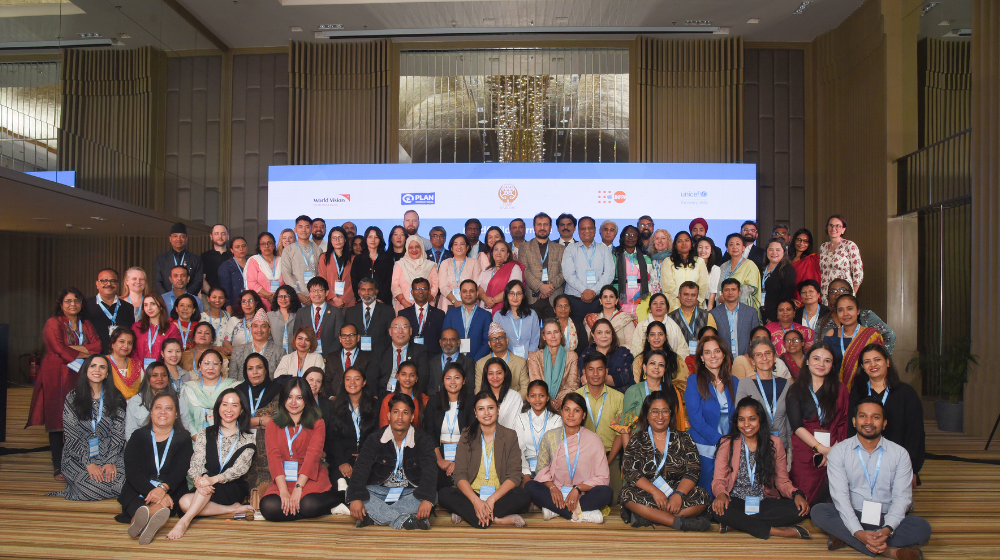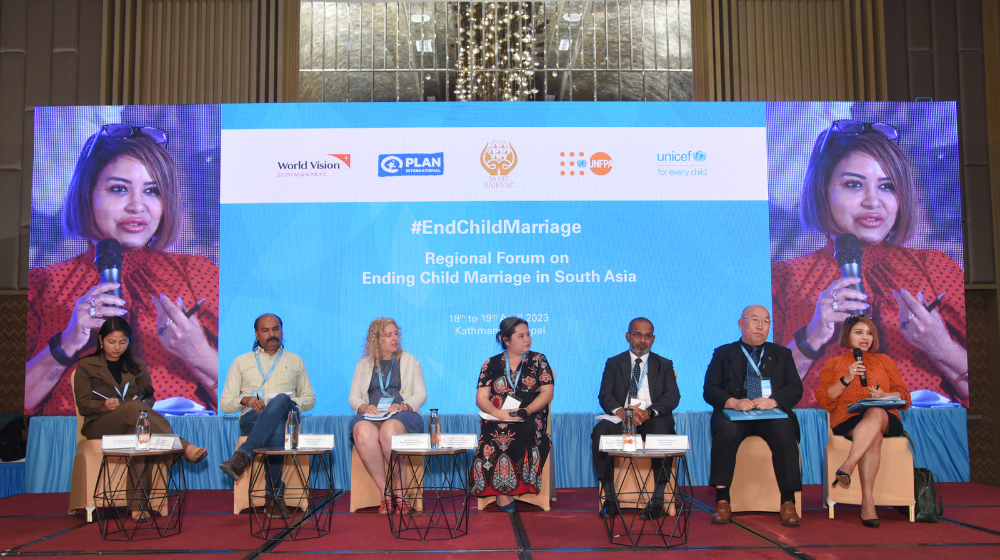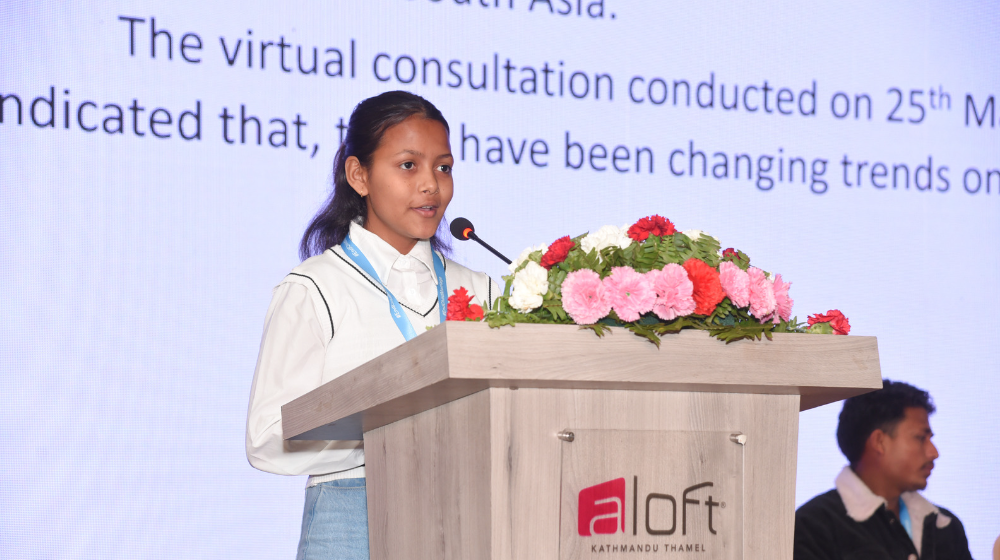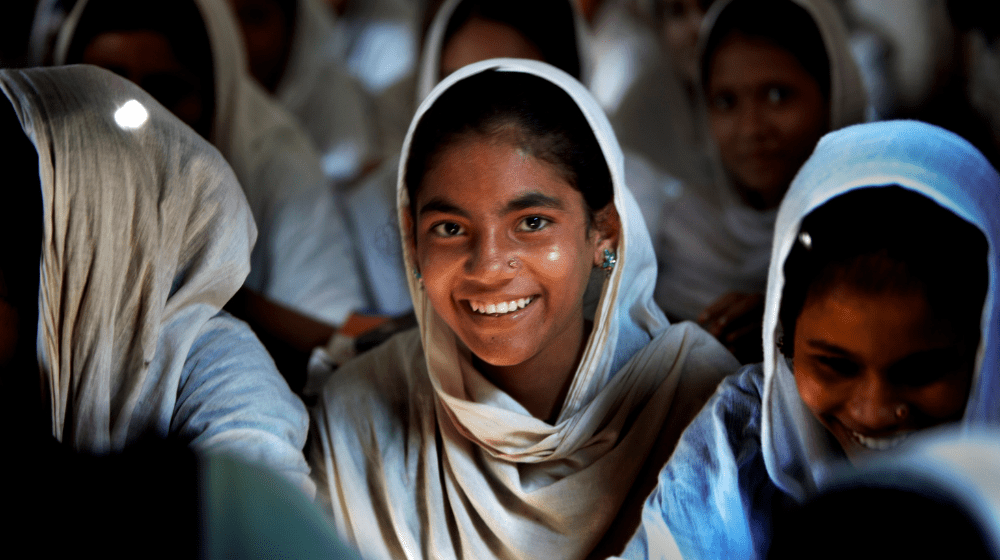KATHMANDU, Nepal, 19 April 2023: More than 100 government, civil society, UNICEF and UNFPA representatives from Afghanistan, Bangladesh, Bhutan, India, Nepal, Maldives, Pakistan and Sri Lanka, alongside experts and young people, called for renewed efforts to end child marriage at the South Asia regional forum organized by UNFPA, UNICEF, the South Asia Initiative to End Violence Against Children (SAIEVAC), Plan International and World Vision.
Participants at the forum, held in Kathmandu between 17-19 April, reviewed implementation of the Regional Action Plan to End Child Marriage, first adopted in 2014 by SAIEVAC, and noted the need to accelerate progress.

“Child marriage remains widespread in many countries, with harmful consequences on girls and the entire society,” said Mr. Björn Andersson, UNFPA Regional Director for Asia and the Pacific, in his opening remarks. “We must do more and strengthen partnerships to empower girls through education, including comprehensive sexuality education, and equipping them with skills, while supporting communities to come together to end this deeply rooted practice.”
South Asia is home to 290 million child brides - the highest number in the world, accounting for 45 per cent of the global total. Despite remarkable headway in reducing child marriage in recent decades, progress remains slow and has been further hindered by economic shocks and the COVID-19 pandemic.
A new child marriage study by UNICEF South Asia found that financial pressure and girls being out of school due to the COVID-19 pandemic drove many parents in South Asia to marry their daughters. “Child marriage locks girls out of learning, puts their health and wellbeing at risk and compromises their future. Every girl who gets married as a child is one girl too many,” said Noala Skinner, UNICEF Regional Director for South Asia ai.

In the Regional Forum, UNFPA released the study titled ‘Digital Research on Harmful Practices in Asia to better understand how individuals and organizations are utilizing social media tools to increase awareness of and spark action in an effort to end child marriage during COVID-19. The report showed that child marriage searches saw the highest volume across India (1,139,060), Bangladesh (156,500), and Nepal (50,940), with 60 per cent of the tweets from India having talked about law-related implications of child marriage; while in Nepal, 88 per cent of the tweets mentioned NGOs spreading awareness around the harmful practice of child marriage. To harness the positive reach of social media tools, the research further recommended stakeholders to diversify their reach across social media platforms in terms of reaching the target audience in providing last-mile support and information about addressing harmful practices.
Participants at the forum highlighted promising solutions in reducing the practice, including working with faith-based leaders and engaging men and boys to positively change how girls are valued by families and communities, and using incentives like cash transfers to counter poverty and build resilience to shocks.
“Eliminating child, early and forced marriage requires long-term and well-resourced efforts,” said Amina Mahbub, Regional Research and Evidence Lead, Plan International Asia-Pacific Regional Hub. “In order to accelerate momentum towards our goal of ending child marriage, the measurement of outcome and impact indicators at regular intervals is essential.”
At the regional forum, young people from the eight countries submitted a joint statement calling on governments to take stronger action. “We don’t want to see a child in a child’s womb. We want to see a baby in a woman’s womb,” said Dola Akter, an 18-year-old activist against child marriage from Bangladesh and member of the Youth Forum. “Girls are not a burden on parents, they are an asset. Governments should give more focus on implementing the laws.” During the pandemic, Dola and her team held over 70 Facebook Lives, educating around 500,000 people about child marriage and their rights.

At the forum, participants identified key actions to accelerate to achieve the targets of the Regional Action Plan to End Child Marriage. Participants called for:
-
Working towards renewal of the Regional Action Plan to End Child Marriage for 2023-2030;
-
Investing in financing and resourcing to develop and retain capacities, addressing sexual and reproductive health and rights and unmet needs as well as investing in comprehensive sexuality education and life skills building;
-
Continuously working with all partners and stakeholders harnessing existing resources and platforms in South Asia to accelerate action;
-
Countering poverty by enacting comprehensive social protection measures, with a focus on the poorest, most disadvantaged households;
-
Safeguarding every child’s right to attend and complete primary and secondary education;
-
Ensuring adequate protective legal and policy frameworks that protect children against child marriage;
-
Accelerating action to address social norms and promote positive behaviours among families, with a focus on men and boys;
-
Meaningfully engaging young people in every decision-making process including design, planning, programme implementation as well as monitoring and evaluation, etc; and,
-
Harnessing technology and using and scaling up innovative gender-transformative approaches to address the issue.
"The Regional Action Plan to End Child Marriage in South Asia, which is entering its third phase in 2023, is a clear indicator of the political and institutional commitment by governments and non-governmental agencies of South Asia to end child marriage,” said Dr Rinchen Chopal, Director General, SAIEVAC Regional Secretariat. “Much progress has been achieved but the battle must and will continue with reinforced and demonstrated commitment."
“Child Protection is a priority for us,” says Cherian Thomas, Regional Leader, South Asia and Pacific Region, World Vision International. “We cannot hope to make any progress as a community towards ending child marriage unless all partners commit to not just work towards ending it, but to ending it together.”
######
Media contacts:
Sabrina Sidhu, UNICEF South Asia, +919384030106, ssidhu@unicef.org
Iman Morooka, UNFPA Asia-Pacific, morooka@unfpa.org, +66 98 669 3725
Vikram Srivastava, SAIEVAC, vikram@saievac.org, +919971884900/+9779828139899
Aaron Aspi, World Vision International, aaron_joseph_aspi@wvi.org, +63 945 755 6701
Pham Trang, Plan International,nhung.phamtrang@plan-international.org,+84906252213
About UNICEF
UNICEF works in some of the world’s toughest places, to reach the world’s most disadvantaged children. Across 190 countries and territories, we work for every child, everywhere, to build a better world for everyone. UNICEF’s Regional Office for South Asia (ROSA) works with UNICEF Country Offices in Afghanistan, Bangladesh, Bhutan, India, the Maldives, Nepal, Pakistan and Sri Lanka to help to save children’s lives, defend their rights, and help them fulfil their potential. For more information about UNICEF’s work for children in South Asia, visit www.unicef.org/rosa and follow UNICEF ROSA on Twitter and Facebook.
About UNFPA
UNFPA works in more than 150 countries and territories around the world, to ensure that every pregnancy is wanted, every childbirth is safe and every young person’s potential is fulfilled.
About SAIEVAC
The South Asia Initiative to End Violence Against Children is an Apex body of SAARC and a unique inter-governmental body with a vision that all children, girls and boys, throughout South Asia enjoy their right to an environment free from all forms of violence, abuse, exploitation, neglect and discrimination. The five major area of focus of SAIEVAC are child marriage, child labor, sexual abuse and exploitation, corporal punishment and trafficking with child participation, gender and disability as cross cutting themes. The Regional Secretariat of SAIEVAC is hosted by the Government of Nepal in Kathmandu.
About World Vision
World Vision has more than 70 years of experience in the Asia Pacific, working with communities, donors, partners, and governments to create opportunities for better futures for vulnerable children…even in the toughest places. Apart from being the most disaster-prone, this region has the highest number of most vulnerable children in the world. Currently, we work in 10 countries in South Asia and the Pacific, reaching out to thousands of communities. Our Christian faith teaches us that every child, regardless of gender, faith or race, is a precious gift to the entire world. We work so that every child can learn, play and enjoy the quality of life they deserve.
About Plan International
Plan International is an independent development and humanitarian organisation that advances children’s rights and equality for girls. Working together with children, young people, our supporters and partners, we strive for a just world, tackling the root causes of the challenges facing girls and all vulnerable children. Plan International has been operating in Asia-Pacific since 1948. We work in 15 countries, helping thousands of very poor communities to fight child poverty and help children realize their full potential.


